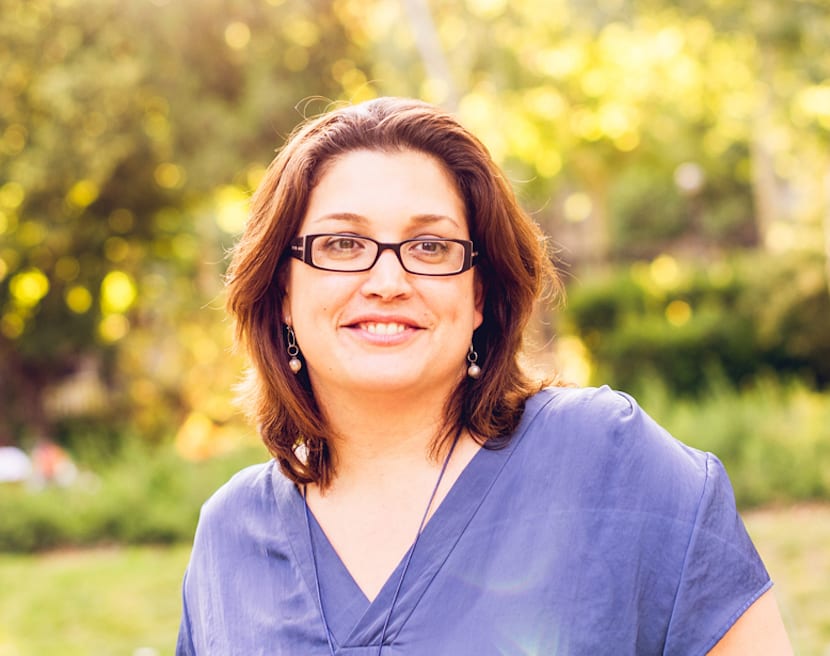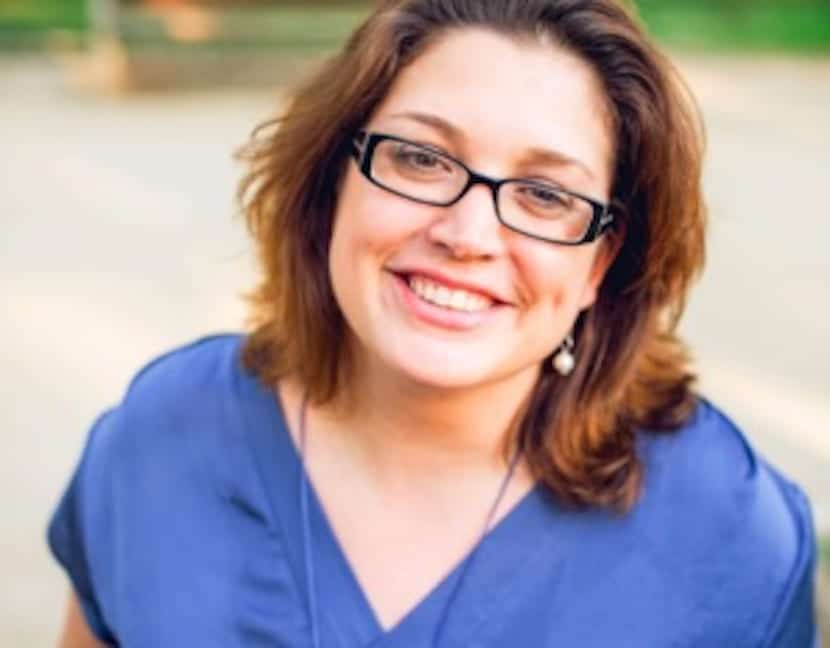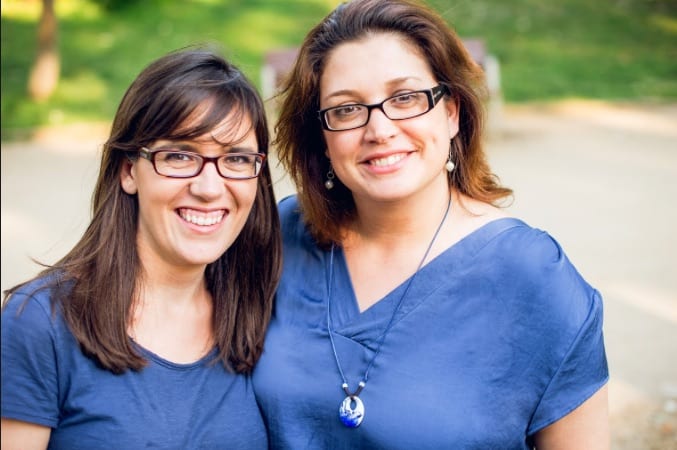
Alba Padró: breastfeeding consultant, IBCLC and co-founder of LactApp.
As you know, Today begins # smml17 (World Breastfeeding Week), and to celebrate we have a very special guest. It is about Alba Padró Arocas, whom you will surely know for her work as a lactation consultant, and because she is one of the founders by LactApp. About LactApp we talked here: it is the most complete and personalized breastfeeding app that Alba created with her partner María Berruezo.
Alba Padró is a lactation consultant and IBCLC (a certificate that accredits consultants internationally), is also a teacher of consultants and health personnel in lactation. She has been supporting new moms for many years, and answering questions about breastfeeding. Be part of Alba Breastfeeding and he has written for many years in “Som la llet” de Criatures (a blog in Catalan belonging to the newspaper Ara). Alba is known for her professionalism and generosity, I attest to both after verifying your willingness to collaborate with this interview, and to realize that she really is a person who knows a lot about breastfeeding ... although I have read statements from her that also show great humility and human quality, and I value that very much.
I do not want to extend this presentation too long, despite the fact that our guest would deserve it, so I leave you with the interview.
Madres Hoy: Is the difference between breastfeeding rates before and after formula feeding widespread?
Alba Padro: It is radically opposite! Before the social normalization of artificial milk feeding the biological norm was to feed the babies with breast milk. There were other options, there always have been, but they posed a very high risk of mortality and morbidity for babies. The milks of other animals, mixtures of milk, flour, honey or other sugars and eggs were emergency homemade preparations.
In the villages the concept of the "milk brothers" has always been known. Having milk siblings was not a secret, it was a pride, everyone knew of the existence of an almost family bond between the children of the woman who had breastfed them, even though they were not biological family.
And on the other hand, when a baby could not suckle or his mother did not want to breastfeed him, depending on the social status and the situation, another woman was sought to raise him or a nurse. Mercenary breastfeeding is part of our history and was a form of employment for many women and a sign of social status for families who requested the services of the nurse.
In our industrialized world now the norm in infant feeding is the use of artificial milk, and Despite the fact that year after year there is an increase in the number of mothers who initiate and maintain breastfeeding, it is a situation that will cost change. In fact, we cannot even be clear that we can reverse it completely again.
There are women in our country who, once they have finished breastfeeding, are not allowed to express milk during their working hours. What is shocking is that their colleagues have the right to go out to smoke but they are not allowed to express milk
MH: What is (or are they) the main enemy of breastfeeding?
AP:The three main enemies are: ignorance, lack of support and difficulties for women to combine work and family life.
Ignorance and lack of information are great obstacles, since women are almost completely unaware of how breastfeeding works. When expectations collide with reality, failure is served. And it is that women do not have references, they do not have enough training or information about breastfeeding, and even if they think they do not know anything about the subject, you can be sure that their brain is full of inputs, that far from helping in times of crisis they will interfere without any doubt: if the child does not get fat, my milk is not good; if the baby cries a lot, my milk does not fill him; if I have pain I have to put up with it ... and so on ad infinitum.
On the other hand, there has been an increasing trend of mothers in the desire and verbalization of initiating breastfeeding. And that desire is irretrievably affected the moment difficulties arise and no one seems to know how to tackle them.. Many women suffer for months, they live a horrible situation that no one should suffer. And it is that if you have pain in one leg, for example, nobody is going to tell you: well, do not use it. Use a wheelchair and worry no more. If your leg hurts, they will try to find the cause and solve it, right? But when a woman has difficulties, pain or doubts, finding help seems like an impossible mission. And without that help, without that encouragement ... abandoning is the option to which you find yourself doomed even if you don't want to.
And finally the conciliation. Although if we compare with other countries on the planet, we have 16 weeks of maternity leave it is a luxury, the reality is that they are totally insufficient. Whether it is 2 weeks, 8 or 16 ... the reality is that women have to leave our babies with other people, on many occasions, our babies much earlier than we would like. In addition, companies do not usually provide women with spaces or times to express their milk and to be able to maintain breastfeeding. There are women in our country who, once they have finished breastfeeding, are not allowed to express milk during their working hours. What is shocking is that their colleagues have the right to go outside to smoke but they are not allowed to express milk.

MH: How do you explain the separation between the thought "breast milk is best for the baby" and the setback in maintaining breastfeeding in recent decades?
AP:I think there are several associated factors. In the first place the disclosure until the standardization that artificial milk today is almost like breast milk. Secondly, the advances in medicine and finally the paradigm shift in our society that leads us to always want the fastest solution.
When breastfeeding doesn't work, there are usually no magic solutions. It takes time, patience and continued support to solve them. If, as I said before, support is usually non-existent, if we add the pressure that many women receive when they have difficulties: do not complicate your life, you want to suffer, it is not worth it, they grow up the same ... And all the messages that we receive daily about the marketing of artificial milk make it very difficult to maintain the concept "it's the best"
And that doesn't just happen to us with breastfeeding. We want miracle foods, products that make us slimmer, creams that improve our skin….
Most mothers want to breastfeed their baby but we have made it a monumental effort that only concerns the mother. If we start from the basis that the mother wants to breastfeed, everything else should be helps to achieve it: antepartum information, full support in the immediate postpartum, prevention of any possible difficulties that may arise, support throughout the process ... the reality is that we are still a long way from providing comprehensive support to these mothers. When difficulties arise we tend to offer alternatives rather than real solutions, and all are judgments towards them, whether they are struggling to continue or if they give up breastfeeding. It must be borne in mind that premature abandonment (earlier than the mother wanted) is a failure of the whole system. Therefore, it is not about convincing mothers that breastfeeding is the best, they already know it. What you have to do is make their work easier and stop putting pressure on them.
There is no other food more perfect for a baby than its mother's milk
MH: Why is mother's milk the best food for a newborn?
AP: Mammalian milk is species specific. Each of the 5400-odd mammals that inhabit this planet make milk with a unique composition for our offspring. Breast milk has endowed mammals with the ability to produce milk, an evolutionary advantage that ensures that each baby has what it needs when it needs it.
The milk of a seal or a whale has a lot of fat, mothers spend hours apart from their young, since they have to return to suckle to feed. It is also cold, which makes it necessary for your milk to have a lot of fat. The milk of hares, for example, has a lot of protein. And it is that the kits need to grow very quickly.
There is no other food more perfect for a baby than its mother's milk.
MH: Are there any real drawbacks that make breastfeeding impossible? With proper counseling, would there be more moms breastfeeding for longer?
AP:Of course they exist! In general, the percentage of women who are going to have production complications is very limited, but they do exist and we have to take it into account. In the same way that there is a percentage of the population with a cardiac affectation or in some other organ, there are women who will not be able to produce milk to exclusively feed their children.
Some years ago the message was launched that all women could breastfeed and like all “totalitarian” messages it has created a lot of guilt and frustration in many women who have not succeeded despite putting all their efforts to do so.
A good professional accompaniment will help mothers to achieve the best possible breastfeeding experience. For example, if you cannot exclusively breastfeed, you can combine it with artificial milk, and there are ways to maintain it over time if that is what the mother wants.
Breastfeeding and working is possible on most occasions and it only takes a little organization, but it requires extra effort and dedication.
MH: And related to the previous question, there may be reasons of all kinds, but regarding a possible incompatibility with work, does whoever wants to do more than who can?
AP: The problem is that mothers are asked to be superwoman, to work, to take care of the children and to do everything perfect.
Breastfeeding and working is possible Most of the time, it just takes a little organization, but it requires extra effort and dedication. Finding the moment, the space, putting up with the gazes and comments of colleagues, transporting and storing the milk ... Breastfeeding and working is one of the main reasons why mothers stop breastfeeding, and it is that we do not have it easy at all. And on top of that, many times women do not know, because nobody explains it to you, that you can combine work with breastfeeding, or that you can breastfeed when you return home with the baby.

Alba Padró and María Berruezo, founders of LactApp
MH: Besides congratulating you on the app you created with Maria Berruezo, I would like you to tell us how did you come up with such a wonderful idea? Why do you think we needed LactApp?
AP: Breastfeeding information is everywhere, and today it is relatively easy to go into Google: search and search…. First you have to separate the wheat from the chaff, discard the information that is not correct or does not adapt to your reality. And once you have correct breastfeeding information, you must search and find out what is going on.
That is exactly what we wanted to avoid. Because, for example, when you have pain or do not know what happens to your baby, you need direct, specific information and you need to know how to name what is happening. LactApp works like a lactation consultant would, you enter a topic and it gives you specific options based on the data you have entered, it guides you to choose what is happening until you reach a final answer. Thus, it does not offer the same options to a mother with a newborn baby as to another with a 6-month-old baby, for example.
We wanted information as personalized as possible so that at each stage the mother finds the answers to all her doubts.
The lactation consultants formed by one of the federations that exist in Spain, we work altruistically within the support groups. That is, we do social volunteering, we give hours of our time to help other mothers who have difficulties
MH: You are a lactation consultant and IBCLC consultant, you already have several years of experience. Can you explain what the role of a lactation consultant consists of?
AP: The figure of the lactation consultant was created in Spain between 1990 and 1992, it was created to seek an alternative figure to the monitors of the milk league, to increase the care groups for mothers.
The lactation consultants formed by one of the federations that exist in Spain, we work altruistically within the support groups. That is, we do social volunteering, we give hours of our time to help other mothers who have difficulties. I believe that we should not lose sight of this, the voluntary and mother-to-mother help nature of our work.. It is essential to work in the GAM (mother to mother support group) because part of the functioning of a group is the support and experience of other mothers. As counselors we lead the sessions, so to speak, but what really helps a mother is hearing her experience from other women, knowing that problems can be overcome, that there is hope.
MH: Grandmothers, lactation consultant friends, health professionals, who should a new mother turn to who has problems establishing or maintaining breastfeeding?
AP: It depends on the type of "problem", it is not easy to know who you have to go to in each case. Breastfeeding is a physiological process so most of the time it is not necessary to go to a toilet Breastfeeding is a physiological process so most of the time it is not necessary to go to a toilet. Day-to-day doubts could be resolved by other women, whether they are friends or family. If we had not lost the culture of breastfeeding they would be the first link in the chain. Now in this link we are the advisors, who supply these women from the family environment who perhaps today do not have the adequate answers for the mother.
And obviously if the problem requires medical attention, the figure of reference is undoubtedly the midwife. We have to increase the training of midwives, they are in charge of responding to women in all their questions about reproductive and sexual health.
The role of governments is precisely to provide these aids to facilitate the success of breastfeeding. To start with, more investment in training and health
MH: Is there anything governments can do to help support breastfeeding?
AP: Power can go a long way, but motherhood and breastfeeding are looked down upon by most governments on this planet. Breastfeeding is a public health issue and advocacy and support should be relevant Breastfeeding is a public health issue and advocacy and support should be relevant to every mother who expresses her desire to breastfeed.
We are entering very swampy terrain because breastfeeding has become a war. It is not about asking women for explanations about their choices, it is about helping and informing all mothers who express that they want to breastfeed. And in the same way, mothers who make it clear that breastfeeding is not their option should be given respect out of hand.
They have a very important role! Mothers have clearly demonstrated that they want to breastfeed and are continually seeking resources and support to do so. The role of governments is precisely to provide these aids to facilitate the success of breastfeeding. To begin with, more investment in training and health, and also notably increasing maternal and paternal leave.
MH: And finally, what would you say to a pregnant mother who is both very eager to breastfeed and very afraid if she does not succeed?
AP: Fear can be a good starting point. If something scares you, it is best to disassemble them little by little, one by one. Go learning, consolidating knowledge, banishing myths and lies ... a pregnancy lasts a long time and allows you to prepare in the theoretical facet. When the practices come, things can get complicated but if you have "approved" the theoretical part, you will move to find help, you will know how to face difficult situations.
And above all, don't be afraid to go to a breastfeeding group during pregnancy., It is the best that they can do.
Once the interview is over, I thank you on behalf of myself and the entire team at Madres Hoy, the invaluable contribution of Alba Padró, offering all the valuable information on breastfeeding that she has given us; and above all making it easier for this blog to start #smlm17 “in a big way”. Thank you Alba, we send you an affectionate greeting.